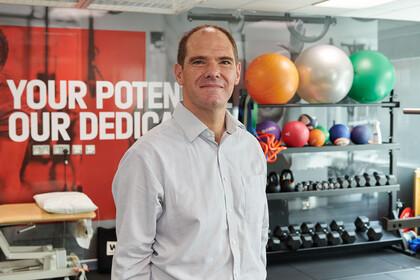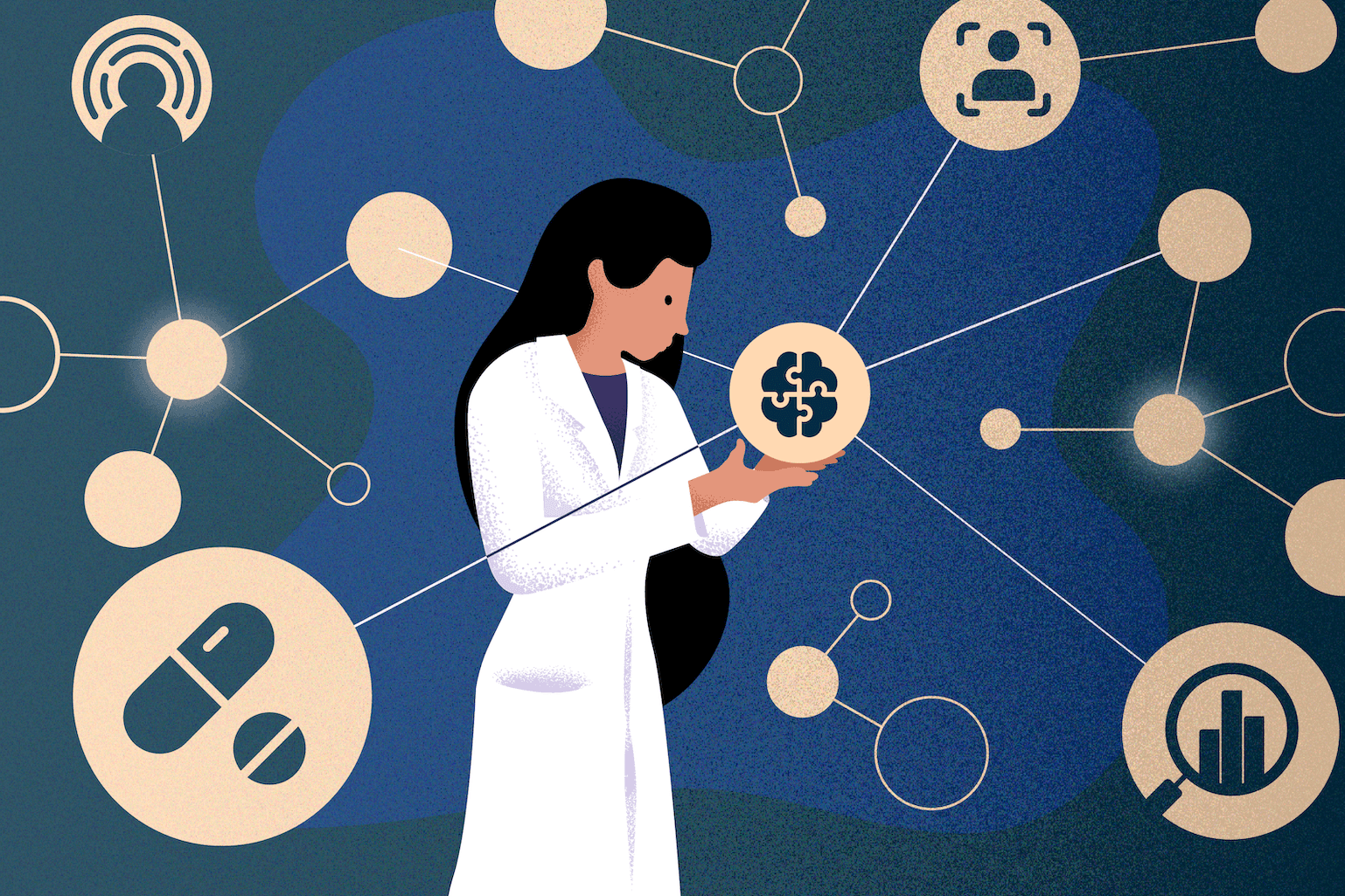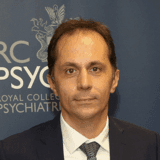
Mental health research lacks focus – but this online resource wants to change that
How can we speed up the search for better mental health treatments? GALENOS is an online resource that aims to do just that by building a more focused mental health field. Here’s how it works.

Vladyslav Bobuskyi via iStock / Wellcome
Mental health research helps us gather evidence, make new discoveries and improve the lives of the millions of people affected globally. The possibilities are huge, but there have been too few major advances in mental health treatment for decades.
One reason is that it can be challenging to find and use the most reliable, up-to-date information in key areas in such a complex field like mental health, where new research is published every day.
A common solution to understanding the high volume of publications is to create a ‘systematic review’, summaries of available research on a topic. However, these summaries can quickly become outdated. Only a third of systematic reviews are updated within two years, and it’s estimated that after two years, 23 percent of reviews that are not updated share incorrect results.
This can make it hard to identify which areas to focus on that will have the biggest impact for people with mental health problems. It can make it difficult for researchers across different areas of mental health, fields and countries to work together. And it can prevent researchers from having a shared understanding of the evidence, which is important for coherence in the field
Now, a free, online mental health resource funded by Wellcome aims to change that.
What is GALENOS?
The Global Alliance for Living Evidence on Anxiety, Depression and Psychosis (GALENOS) produces ‘living’ systematic reviews on mental health topics covering diagnosis, intervention and risk prediction. This means the reviews are continuously updated with the latest evidence as it becomes available.
The project team organise and analyse the ever-expanding research on anxiety, depression and psychosis across all disciplines and from around the world. Researchers anywhere in the world can then instantly and freely access this information. While the reviews are currently being updated by people, the team is working on ways to automate the process and make it more sustainable.
“The impact, we hope, will be transformative,” says Niall Boyce, Head of Field Building in Mental Health at Wellcome.
“GALENOS aims to very closely link the research which is being published and research which is currently being done. By setting out clear research priorities, it will encourage progress in the field.”
This innovative model could help identify research gaps, accelerate the search for answers and treatments for anxiety, depression and psychosis – and improve people’s lives.
Why are we funding GALENOS?
We’re funding GALENOS as part of our vision to build a more coherent, collaborative and focused field of mental health science.
Niall Boyce, Head of Field Building in Mental Health at Wellcome, shares three key areas that this vision will foster:
- Collaboration: we need to get researchers within different areas of mental health working together, as well as working with people outside of the field and internationally.
- Coherence: we need to understand each other in this complex and diverse field, for example, through standard metrics or concepts.
- Focus: we need to make sure that the mental health field is giving enough attention, effort and resources to research areas which are going to make a difference in anxiety, depression and psychosis.
Bringing lived experience expertise to the table
For Boyce, who has worked in mental health for nearly two decades, one of the most exciting features of the project is the scale of collaboration.
“Mental health science is very complex,” he says. “And to understand and advance it, we need to have a lot of information and hear from many different voices.”
As well as encouraging international collaboration from the researchers who use this resource, “GALENOS is a big collaborative project in itself,” says Boyce. “It involves researchers from all over the world and from different specialities, including lived experience.”
The project has been co-developed with MQ Mental Health Research, a charity that champions patient and public involvement in research. A Global Experiential Advisory Board, formed by people who have lived experience of mental health challenges, oversee every aspect of the project.
“It’s important for GALENOS to co-produce everything with people with lived experience,” says Tate Kambeu, Vice Chair of the Global Experiential Advisory Board.
She works to ensure meaningful collaboration between researchers and individuals with lived experience expertise.
“People with lived experience will be involved with choosing the questions and developing the protocols for the living systemic reviews, helping with data analysis and writing up the research findings,” says Kambeu.
It’s through this collaboration, Kambeu explains, that “mental health research can speak directly to and address the needs of the people it aims to support”.
“Collaboration between these two groups ensures a more person-centred approach to mental health research rather than a largely theoretical model. It paves the way for a more empathetic system,” she says.
Kambeu hopes that GALENOS will set an example to others and encourage more researchers and organisations to involve people with lived experience expertise in their teams.
And, for people with lived experience, she hopes GALENOS encourages them to use their voices to bring about positive change in mental health research.
We’re funding research to help create transformative change in early intervention for anxiety, depression and psychosis.
There are currently no open funding opportunities for Mental Health. Learn more about the funding we provide.
Driving breakthroughs in mental health research
Another key element of the GALENOS project is that the team will collect and compare information from both human and non-human studies to see if the results point to the same conclusions. This is called triangulation, and it helps strengthen the validity of research findings.
“While the idea of combining results from different sources has been around for a few years, it hasn’t been done properly in mental health yet,” says Andrea Cipriani, Director of GALENOS. “Triangulation is a relatively new methodology and a growing field, so what we will do is something that’s not available now.”
Triangulation can also help identify the interventions that don’t work – and that’s a good thing, says Cipriani.
“There’s a lot of interest and hype for findings in animal studies. When you translate it into human studies, they don’t always work, and we don’t know why,” he explains. “So, triangulating the two data sources will allow us to be more precise and assess the quality of the available information.”
This precision is crucial in improving mental health research. If we can identify the aspects of interventions that drive a positive clinical effect, we can improve existing treatments and help develop new ones.
“One of the main problems we have in mental health is we don’t know the exact mechanism behind the symptoms of the disorder that we see in the clinic,” says Cipriani. “So, we are doing things by chance without a specific rationale.
“A lot of mental health interventions we use today were found through research in other fields. For example, people were studying a drug for tuberculosis, and they found that it had a stimulant effect. It increased vitality in the patients and some of them expressed the desire to leave the hospital. So, they worked backwards to find the structure of this molecule and developed the first drugs to treat depression.”
That's why Cipriani believes GALENOS will spark a fundamental change in the mental health field – because the project will transform how we identify the mechanisms that make a difference.
In doing so, GALENOS will guide researchers to focus on the most evidence-based research areas with opportunities for breakthroughs and, ultimately, help people living with mental health challenges.
“It’s only if we understand what causes what that we can improve the quality of the mental health treatments and interventions we have,” says Cipriani. “GALENOS aims to improve patient outcomes – from their diagnosis, prediction and prognosis to the pharmacological and psychological interventions they receive."
How to access GALENOS
GALENOS produces living systematic reviews on mental health topics covering diagnosis, intervention and prediction. The reviews can be accessed online via Wellcome Open Research.




